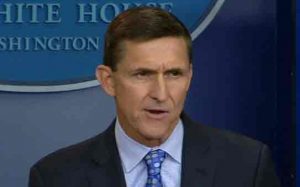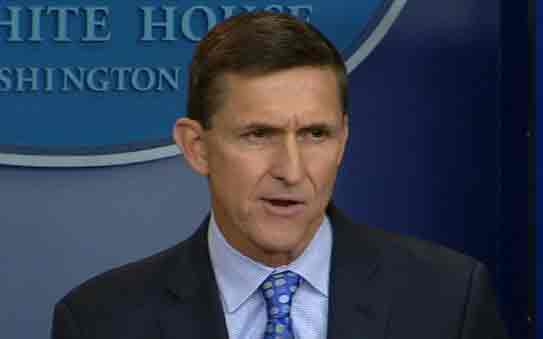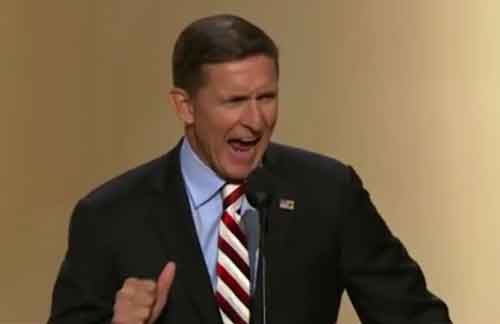
U.S. national security adviser Michael Flynn has resigned following widespread reports he had misled Trump administration officials, including Vice President Mike Pence, about his contacts with Russia.
In his resignation letter, Flynn, a retired Army general, acknowledged late Monday he had “inadvertently briefed” Pence and others with “incomplete information” regarding his phone calls with the Russian ambassador to the United States in the weeks before President Donald Trump assumed power.
It’s with a heavy heart that I’ve tendered my resignation to @POTUS. It’s been an honor & privilege to serve. Thank you all for your support pic.twitter.com/WtOfRhC9XE
— Michael Flynn (@GenMikeFlynn) February 14, 2017
Such a high-level resignation less than a month after Trump took over the White House is virtually unheard of on the American political scene.
Trump, however, attempted to downplay its significance on Tuesday, writing on his Twitter account, “The real story here is why are there so many illegal leaks coming out of Washington? Will these leaks be happening as I deal on N.Korea etc?”
The real story here is why are there so many illegal leaks coming out of Washington? Will these leaks be happening as I deal on N.Korea etc?
— Donald J. Trump (@realDonaldTrump) February 14, 2017
WATCH: White House Press Secretary Sean Spicer on Flynn
Congressional reaction
Key opposition Democratic lawmakers called for expanded investigations into links between Russia and Flynn and other key Trump aides, extending beyond the conclusion reached by the U.S. intelligence community last year that Russia meddled in the presidential contest in an effort to help Trump win.
“This. Is. Not. Normal,” said Democratic Senator Elizabeth Warren, a vocal Trump critic.
After Flynn’s resignation, Trump quickly named another retired Army general, Keith Kellogg, as his acting national security adviser, but also could pick former Central Intelligence Agency chief David Petraeus or former Navy Vice Admiral Robert Harward to fill the strategic position on a permanent basis.[xyz-ihs snippet=”Adsense-responsive”]Flynn and Russian Ambassador Sergey Kislyak, according to widespread U.S. news accounts, discussed sanctions former President Barack Obama imposed on Moscow late last year for its interference in the U.S. presidential election in an effort to boost Trump’s chances of winning.
Pence and Trump aides, relying on information from Flynn, said publicly that Flynn had not discussed lifting the sanctions, which are still in place, once Trump was inaugurated January 20. Flynn later acknowledged the issue may have come up.
Conversations such as those between Flynn and Kislyak possibly could have been a violation of a U.S. law that prohibits private citizens from conducting diplomatic affairs with a foreign government, because Trump had yet to take office.
Justice Department warning
The U.S. Justice Department, according to The Washington Post, warned the White House last month that Flynn had so misrepresented his conversations with the Russian envoy that he might be vulnerable to blackmail by Moscow, as a result of the contradictions between the public descriptions of the calls and what intelligence officials knew based on their routine monitoring of communications by foreign officials in the United States.
Flynn, in his resignation letter, said he had apologized to both Trump and Pence, and that they had accepted his apology.
Kremlin spokesman Dmitry Peskov said Tuesday that Flynn’s resignation “is the internal business of the Americans, it is the internal business of President Trump’s administration. This is not our business.”
Russia reacts
But Russian lawmakers said Flynn’s quick departure amounted to an attack on attempts to improve relations between Moscow and Washington.
Leonid Slutsky, who heads the Duma’s foreign affairs committee, said Flynn’s resignation was a “negative signal.”
A member of the Duma, Konstantin Kosachev, who is chair of Russia’s Foreign Affairs Committee, said, “Even a readiness to have a dialogue with Russians is seen by the hawks in Washington as a thought crime. Forcing the resignation of the national security adviser for contacts with the Russian ambassador, which is normal diplomatic practice, is not just paranoia but something immeasurably worse.”
Source: VOA [xyz-ihs snippet=”Adsense-responsive”]







